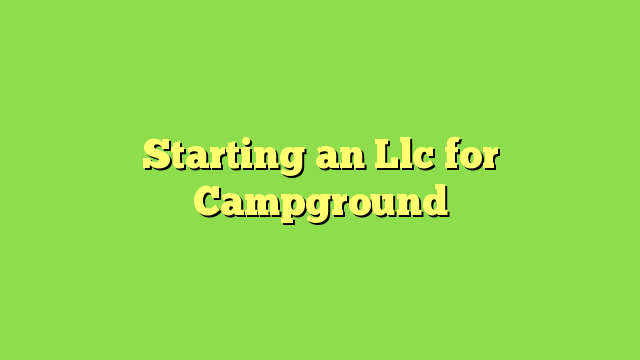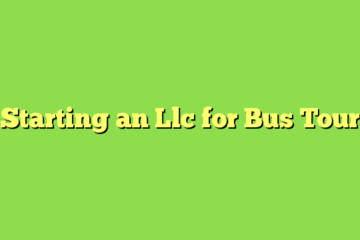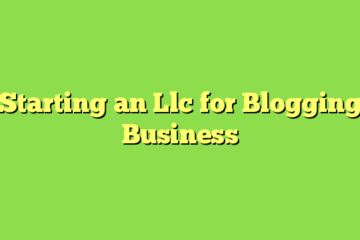Are you ready to turn your love for the great outdoors into a thriving business?
Starting an LLC for your campground is the first step towards making your dreams a reality. With an LLC, you’ll enjoy the benefits of limited liability and flexibility in managing your business.
This article will guide you through the process of:
- Choosing a business name
- Registering your LLC
- Obtaining permits and licenses
- Creating a business plan
- Effectively marketing your campground
Get ready to take your camping venture to new heights!
Choosing a unique and memorable business name is important for creating a strong first impression for the campground. Conducting market research and checking for existing names and trademark issues is crucial to avoid legal complications. Obtaining permits and licenses for zoning, health, and safety regulations is necessary to comply with local government requirements. Developing a comprehensive business plan, including financial projections and effective marketing strategies, is essential for the success of the campground LLC.
Choosing a Business Name
When starting an LLC for your campground, you need to choose a unique and memorable business name. The name of your campground is the first thing potential customers will see and hear, so it’s important to make a strong first impression.
To come up with a great business name, start by brainstorming ideas. Think about the theme or atmosphere of your campground and the type of experience you want to offer. Consider using words that evoke nature, adventure, or relaxation.
Once you have a list of potential names, it’s time to conduct market research. This will help you determine if any of your name options are already in use or if there are any trademark issues. You can also get feedback from friends, family, and potential customers to see which names resonate the most with them.
Understanding the Benefits of an LLC
To understand the benefits of starting an LLC for your campground, you should consider the advantages it offers in terms of liability protection and flexibility.
One of the main reasons to form an LLC is to protect your personal assets from any potential lawsuits or claims that may arise in the course of operating your campground. By establishing your campground as an LLC, you create a separate legal entity that shields your personal assets, such as your home or savings, from being used to satisfy any debts or liabilities incurred by the business.
Another benefit of an LLC is the flexibility it provides in terms of taxation. Unlike a corporation, an LLC isn’t subject to double taxation. Instead, the profits and losses of the LLC are passed through to the individual members, who report them on their personal tax returns. This means that you can avoid the corporate income tax and only pay taxes on your personal income.
In addition, an LLC offers flexibility in terms of management and ownership. You can choose to have a single-member LLC, where you’re the sole owner and manager, or you can have multiple members who share in the ownership and management responsibilities.
Registering Your LLC
To register your LLC for the campground, gather all the necessary documents and submit them to the appropriate state agency.
The LLC formation process requires you to comply with certain legal requirements. First, you’ll need to choose a unique name for your LLC. Make sure it reflects the nature of your campground business and isn’t already registered by another company.
Next, file your Articles of Organization with the state agency responsible for LLC registrations. This document outlines important details about your LLC, such as its name, address, and members. Along with the Articles of Organization, you’ll also need to pay the required filing fee.
After submitting the necessary paperwork, it’s important to obtain an Employer Identification Number (EIN) from the IRS. This number is essential for tax purposes and allows you to hire employees if needed.
Lastly, remember to comply with any additional state-specific requirements, such as obtaining licenses or permits related to operating a campground.
Obtaining Permits and Licenses
To ensure compliance with all legal requirements, you’ll need to obtain permits and licenses for your campground LLC. Obtaining zoning, permits, and licenses is crucial for operating your campground business smoothly and avoiding any legal issues.
Firstly, you need to obtain zoning permits from the local government. This permit ensures that your campground is located in a designated area for such activities. It’s important to research and understand the zoning regulations in your area before applying for the permit.
Next, you must obtain the necessary permits and licenses to ensure compliance with health and safety regulations. These include permits for water and sewage systems, fire safety, food handling, and any other applicable permits depending on the facilities and services you offer at your campground.
To obtain these permits and licenses, you’ll need to submit applications to the relevant local government departments or agencies. It’s essential to prepare and submit all the required documentation accurately and on time to avoid any delays or complications.
Creating a Business Plan
You should begin by developing a comprehensive business plan for your campground LLC. This plan will serve as your roadmap, guiding you through the process of starting and running your campground business. It will help you clarify your goals, identify your target market, and develop a strategy for success.
One important aspect of your business plan is developing financial projections. This involves estimating your startup costs, projected revenue, and expenses. By creating realistic financial projections, you can determine if your campground business will be financially viable and make necessary adjustments to ensure profitability.
Another key component of your business plan is identifying your target market. Who are your ideal customers? What’re their needs and preferences? By understanding your target market, you can tailor your services and marketing efforts to attract and retain customers. Conduct market research to gather information about your potential customers and competitors. This will help you develop effective marketing strategies and differentiate your campground from others in the area.
Marketing and Promoting Your Campground
Now that you’ve laid the foundation for your campground business, it’s time to focus on marketing and promoting your venture.
Social media advertising is a powerful tool that can help you reach a wide audience and showcase the unique experiences your campground offers.
Additionally, partnering with influencers in the outdoor and travel niches can help you tap into their engaged and loyal followers, boosting your visibility and credibility.
Social Media Advertising
Maximize your campground’s visibility and reach potential customers through strategic social media advertising campaigns.
Social media has become a powerful tool for marketing and promoting businesses, including campgrounds. One effective strategy is influencer marketing, where you collaborate with popular social media personalities who can promote your campground to their large following. By partnering with influencers who have a strong presence in the travel and outdoor niche, you can target specific demographics that are more likely to be interested in camping and outdoor activities.
This targeted approach ensures that your advertising efforts are reaching the right audience, increasing the likelihood of attracting potential customers. Additionally, social media platforms offer advanced targeting options that allow you to refine your audience based on location, interests, and other relevant demographics.
Influencer Partnerships
To effectively market and promote your campground, consider forming influencer partnerships that leverage the reach and influence of popular social media personalities in the travel and outdoor niche.
Collaborating with influencers can be a powerful way to increase brand awareness and attract new customers to your campground. By partnering with influencers who have a strong following and engagement in the camping and outdoor community, you can tap into their loyal audience and expand your reach.
To maximize the impact of influencer collaborations, it’s crucial to measure the results. Track metrics such as website traffic, social media engagement, and bookings to assess the effectiveness of each partnership. This data will help you evaluate the return on investment and make informed decisions for future influencer collaborations.
Conclusion
So, what’re you waiting for? Starting an LLC for your campground is a strategic and persuasive move that offers numerous benefits. By choosing a distinctive business name, registering your LLC, obtaining the necessary permits and licenses, creating a solid business plan, and effectively marketing your campground, you can set yourself up for success. Don’t miss out on the opportunity to turn your campground into a thriving business that attracts campers from far and wide. Start your journey towards success today.
Frequently Asked Questions
What Are the Typical Start-Up Costs for Opening a Campground LLC?
Starting an LLC for a campground can be expensive. Typical startup costs include purchasing land, constructing facilities, obtaining permits, and marketing. Finding investors and implementing effective marketing strategies are crucial for success.
How Can I Find Suitable Land or Property to Purchase or Lease for My Campground?
To find suitable land for your campground, consider budget considerations. Research local real estate listings and contact brokers. Visit potential properties to assess their suitability for your needs. Negotiate lease or purchase terms that align with your budget.
Are There Any Specific Insurance Requirements for Operating a Campground LLC?
To operate a campground LLC, you must meet specific insurance requirements. Liability coverage is crucial to protect you from potential accidents or damages on your property. Make sure to research and obtain the necessary coverage for your business.
What Are the Key Factors to Consider When Designing the Layout and Amenities of a Campground?
When designing the layout and selecting amenities for your campground, consider factors such as the size and accessibility of each campsite, proximity to water and restroom facilities, and options for recreational activities.
What Are Some Potential Challenges or Risks Involved in Running a Campground LLC?
Challenges and risks in running a campground LLC include seasonal fluctuations in demand, managing operational costs, attracting and retaining qualified staff, and ensuring compliance with regulations. It’s crucial to plan and adapt to mitigate these risks.

Aisha Noreen is an owner of a small business with more than 9 years of experience in the marketing industry. With the wisdom of an old soul, she always seeks innovation and mind-blowing ROI techniques. Her unique approach helped many small businesses thrive and she can surprise you in many ways as well. Believe it or not, her energy, passion, and creativity are contagious enough to transform your business and take it to another level.









